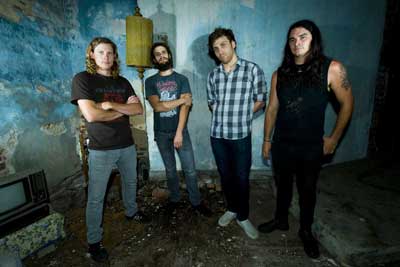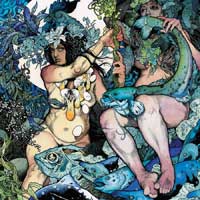
Baroness
Elianne Halbersberg
Growing up together in Lexington, VA., the members of Baroness – Allen Blickle (drums), Summer Welch (bass), John Baizley (guitars/vocals), and Pete Adams (guitars/vocals) – knew early on that there was life outside of the Blue Ridge Mountains and that their passion for making music would be the ticket. Their long ride to a record deal and international recognition has been filled with hard roads in search of the rewards.

In 2007, Baroness released their first disc for Relapse Records, Red Album. Touring extensively across the U.S. and Europe created a solid fan base. This, in turn, led to their 2009 follow up, Blue Record, entering Billboard’s “Heatseekers” chart at No. 1. Since then, Baroness has continued to play gig after gig, selling out their own shows and opening for major acts such as the Deftones and now Metallica, with whom they will tour Australia in November.
Summer Welch spoke with Ink 19 about getting out of Dodge, the pros and cons of promoting a band in the age of technology, and what it means to hold down the rhythm in the unique music of Baroness.
• •
What were the odds of getting out of that small town?
I know people who grew up there and are still there, working shitty jobs, and maybe they’re unhappy. The odds were very slim, but my parents were very, very supportive of my endeavors, and prior to music I was active with sports. I cycled a lot and raced mountain bikes growing up, so there was always something that occupied my time and that I invested my energy into. At 16, I discovered music and punk rock. All my friends played music. Alan and Pete were in a band together and I was envious that they had a band. Nobody in our circle played bass, so I learned to play. Through high school, everyone who is in Baroness now was in a band, playing different genres of music, but we all went separate ways. Everybody had the drive to get out of that small town and do something else. It was obvious to all of us internally that there was much more out there to be done. I moved to Croatia as part of an exchange program, Alan went to college, Pete joined the Army, and John moved to Savannah, Georgia, with his girlfriend because she was going to school there. When I got back from Europe, I didn’t want to be in Lexington, so I moved to Savannah. John and I lived together and wrote music, and his girlfriend put up with a lot of shit. They’re still together; they have a baby and they’ve made it work. We all migrated here at different intervals. It’s been a long time coming for sure.
How much of your success is due to the current musical climate? The playing field is open to bands that do things a bit differently. How much of this is also due to the Internet?
That’s a tough question, but I know what you’re saying. Five years ago it was a lot harder for bands to climb the ladder, especially underground bands. A lot of it has to do with the Internet, because anybody in the world can log on and find totally obscure D.I.Y. bands in the middle of nowhere America. Suddenly a kid in Indonesia is listening to your music. Five years ago an underground band had to tour their asses off to be heard. We got in at the end of an era of music and shows. I booked the first few tours we did. I had phone numbers, I made the calls, there was word of mouth and verbal communication. I wasn’t savvy to MySpace yet, so we’re fortunate to be part of it. But we started out before that. Now you put up a MySpace page and you get popular overnight, and bands who have been busting their asses for 10 years or were considered underground are accessible to everyone. There’s definitely a resurgence in more underground rock, heavy metal, and bands who were popular five years ago. It’s accessibility and metal being popular again. Those things don’t hurt.
How involved are you with social networking?
I am not personally involved. I have a MySpace page but I don’t use it often. I use it to connect with people overseas, but I’m not on Facebook or Twitter. The whole social networking thing gives me the creeps. It’s a useful tool for bands, and I understand the desire and infatuation and people being obsessed with it, leaving comments like they’re friends with you, but they’re not. Facebook especially. I have friends who spend a lot of time online chatting and it doesn’t seem real to have 800 friends online. When I ask them, “How many people do you see in the flesh?” “Oh, never.” “Oh, maybe three times a year.” Expectations and relationships become incredibly high because of things like text messaging and the accessibility of social networking. There is no room for patience anymore. You send somebody a message and you want them to get back to you within three hours. I see it in my circle. It has developed insecurity in people. Five years ago, everybody had an answering machine and not that many people had cell phones. You called, left a message, and someone would get back to you in the next two or three days. Society has built itself around faster, faster. Our label runs our Facebook and Twitter pages. They update them, and all I ask is that they don’t personalize it to say “we.” It’s not we. It’s them. We have tried hard to preserve ourselves in some way, and it’s hard because people want to know “why” with every question. Just enjoy it for what it is and form your own ideas about what you’re hearing. Our shows are about music, not who we are, what we’re wearing, and what we like to do on the weekends. That’s the society we live in. You have to find a balance and appeal to the general populace while maintaining your integrity. It’s a fine line to walk, but at the end of the day we follow our hearts and that makes it seem much more legitimate and honest.
After years of doing it yourselves, you opted to sign a record deal. Why?
At the time, we were on our second or third EP on a very small independent label in Savannah. The deciding factor with Relapse was distribution, because our distribution was very small. We were able to reach a bigger audience. One man was running our label and it was just too much for him to do. Relapse approached us a year before we signed with them. We told them no twice; we wanted to stay with this guy and do it ourselves. They were persistent and came back. A year after their initial interest, we did our homework, talked to a lot of people, got a lawyer, and signed a good deal. We maintained a lot of the artistic, visual, and musical control. We have complete control. They’ve been a wonderful group of people to work with, they’re really supportive and they pushed us. They have the means to do things that we as four dudes can’t do. They have the power to get the music to a broader audience and get more people to hear it, which ultimately is better. There is a line of keeping it real. People say we’re selling out, but we’ve always been D.I.Y., we’ve always done everything ourselves, and we’re still busting our asses and getting our hands dirty. The people at Relapse are real; we can call and talk to them. It’s a very cool environment.
We discussed why you began playing bass. Let’s talk about the dynamics of the instrument. When people think about bass, they often think about jazz or funk, but it can also be an aggressive instrument. Your thoughts?
It can go both ways. It can be aggressive, and at times it needs to be, but there’s definitely plenty of room for a bass player not to be aggressive. The progression of our music … we started out as a very aggressive, primal thing. We were a lot younger, and when we started writing we were more angsty and angry at the world. Our music was a reflection of that. It still is, but we have matured as individuals, and every time we write music it’s a refinement process as we try to maintain the energy and rawness, and refine it to a more palatable sound that speaks to us. At 19, you want heavy, fast, and loud all the time, but sometimes now I like to relax with a calm and soothing piece of music. In writing, we try to cater to all of our different moods, feelings, and desires, and not be constricted to one genre. A lot of bands do it a certain way and it works for them, like Slayer – they are still heavy, fast, and loud, and more power to them, but that doesn’t work for Baroness. The music changes, morphs, and grows, as we do as people.
The bass in general can be applied to easy, hard, or whatever type of music you are creating. I have been playing since I was 16 and I still have a lot to learn. I don’t consider myself a great bass player or a great musician. I’ve just always enjoyed being part of this band and being with these people. Everything I’ve learned, I taught myself through listening. I regret not taking lessons, because my theory knowledge is not that great and I would like to work on that.

For some bands, it’s a two-on-two team situation, with the rhythm section on one team and dual guitars on the other team. Having known each other since childhood, does that make it more than the sum of its parts?
With us, yes, it is the sum of four parts. There are moments in the songs when the rhythm section is working together as a driving factor, and sometimes it’s the guitars, but I don’t separate it too much. We’re not solely guitars or bass or drums. It’s a mixture of all four of us together, and in my head I never think about it individually. It is what it is, and because we’ve been together for so long, as you’re saying, together and growing so much, I don’t know how I think of it anymore. It’s just part of us and it’s what we do.
Baroness: http://www.relapse.com/artist/artist.aspx?ArtistID=10190 • Baroness MySpace: http://www.myspace.com/yourbaroness












